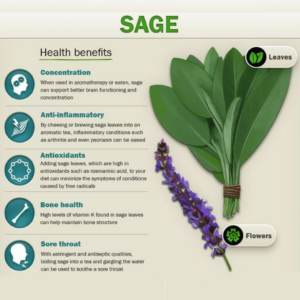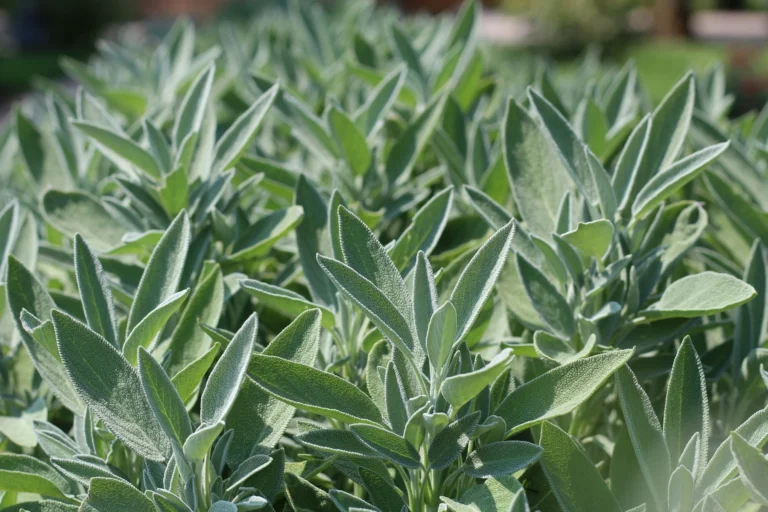What is Sage?
Sage, also known as common sage or garden sage, with the scientific name Salvia officinalis, is a well-known herb beloved for its bold, earthy flavor. It belongs to the mint family, which includes other aromatic herbs like oregano, rosemary, basil, and thyme. Due to its strong taste, sage is typically used in small amounts, adding depth and complexity to a variety of dishes.
The medicinal use of sage dates back centuries, and this versatile herb is packed with surprising health benefits and nutrients, making it much more than just a flavorful addition to your kitchen spice rack.
Sage Benefits
- Rich in Nutrients: Sage is a powerhouse of vitamins and minerals. It’s particularly high in vitamin K, which plays a crucial role in blood clotting. In addition, sage provides magnesium, zinc, and copper—important minerals for overall health.
- Antioxidant Properties: Sage is rich in antioxidants that help combat free radicals in the body, which can damage cells and lead to chronic diseases like cancer. Sage contains antioxidants such as vitamins A, C, and E, and over 160 types of polyphenols—compounds linked to improved health outcomes like reduced cancer risk, enhanced brain function, and better memory. Specific acidic compounds in sage, including chlorogenic acid, caffeic acid, and rosmarinic acid, also contribute to these antioxidant benefits. A study has shown that drinking sage tea may increase antioxidant defenses while lowering LDL (“bad”) cholesterol levels, and simultaneously boosting levels of HDL (“good”) cholesterol.
 Oral Health: Sage has powerful antimicrobial properties that help combat plaque and prevent dental issues. Research has found that sage-based mouthwash effectively kills cavity-causing bacteria like Streptococcus mutans. Additionally, sage essential oil can fight fungal infections like Candida albicans and prevent its spread, showing promise as a remedy for oral health issues like cold sores, though more research is needed to confirm its effectiveness in humans.
Oral Health: Sage has powerful antimicrobial properties that help combat plaque and prevent dental issues. Research has found that sage-based mouthwash effectively kills cavity-causing bacteria like Streptococcus mutans. Additionally, sage essential oil can fight fungal infections like Candida albicans and prevent its spread, showing promise as a remedy for oral health issues like cold sores, though more research is needed to confirm its effectiveness in humans.- Menopause Relief: During menopause, women often experience a decrease in estrogen levels, which can lead to symptoms like hot flashes, excessive sweating, vaginal dryness, and irritability. Sage has been traditionally used to alleviate these symptoms due to its estrogen-like properties, which help bind to brain receptors, reducing hot flashes and sweating. A study found that sage supplements significantly reduced hot flashes in participants over an 8-week period.
- Blood Sugar Control: Sage has also shown promise in controlling blood sugar levels. Studies in rats have shown that sage extract reduces blood glucose levels and enhances insulin sensitivity, similar to the effects of some diabetes medications. Although more research is needed in humans, sage extract may offer a natural way to manage blood sugar, making it a potential adjunct to diabetes treatment.
- Cognitive Function: Research indicates that sage may help improve cognitive functions, such as memory, attention, and problem-solving. In one study, individuals with mild to moderate Alzheimer’s disease who took sage extract for 16 weeks showed improved cognitive abilities and less agitation. However, more research is needed to confirm these benefits.
- Antidepressant Effects: While early studies on clary sage oil show it may have anti-stress effects, research is still in its infancy. Some animal studies suggest that clary sage oil might have potential in treating depression, but human trials are necessary to draw any conclusions.
Nutritional Profile of Sage
Sage is a nutrient-dense herb, providing essential vitamins and minerals, including:
- Vitamin K (helps with blood clotting)
- Vitamin A and C (antioxidants that reduce the risk of serious health conditions)
- Calcium, iron, and magnesium (important for bone health and overall body function)
Nutritional Information per Teaspoon (0.7 grams) of Ground Sage:

- Calories: 2
- Protein: 0.1 grams
- Fat: 0.1 grams
- Carbohydrates: 0.4 grams
- Fiber: 0.3 grams
- Sugar: 0 grams
- Vitamin K: 10% of the Daily Recommended Intake (DRI)
- Iron: 1.1% of the DRI
- Vitamin B6: 1.1% of the DRI
- Calcium: 1% of the DRI
- Manganese: 1% of the DRI
Although sage is consumed in small quantities, its concentrated nutritional profile provides a high amount of essential nutrients with minimal calories.
Potential Risks of Sage
- Thujone Toxicity: Sage contains thujone, a compound that has been shown to be toxic to the brain in large doses in animal studies. However, there is no evidence to suggest that thujone in sage is toxic to humans when consumed in normal culinary amounts. Excessive intake of sage tea or sage essential oils, however, can pose risks.
- Sage Tea and Essential Oils: It’s important not to consume sage essential oil, as it can cause poisoning. Even small amounts of essential oil have been linked to serious side effects like seizures, especially in children. If drinking sage tea, limit your consumption to 3–6 cups per day for safety.
How to Prepare and Use Sage
Sage can be used in various culinary applications, either fresh or dried. Whole leaves are often used in cooking, and sage can also be ground into powder for use in recipes. Here are some popular ways to incorporate sage into your meals:
- Add fresh sage leaves to soups and stews.
- Sprinkle sage on roasted vegetables.
- Mix sage into stuffing for poultry dishes.
- Make sage butter by blending chopped sage leaves with butter.
- Use sage as a rub for meats like chicken or pork.
- Add sage to omelets or scrambled eggs for extra flavor.
Sage Tea Preparation:
To prepare sage tea, boil 1 cup of water and pour it over 1 tablespoon of dried sage leaves. Let it steep for 5–8 minutes, depending on how strong you like it, then strain the leaves. You can sweeten your tea with sugar or honey, or add lemon juice, cinnamon, or zest for a flavorful twist.
Potential Risks of Sage Oil:
While sage essential oil is known for its therapeutic properties, it can be dangerous if misused. The oil should never be ingested, and even small amounts can cause serious health risks, such as seizures, especially in children. Essential oils can also cause allergic reactions, so it’s important to test a small amount before use and seek medical attention if severe reactions occur.



